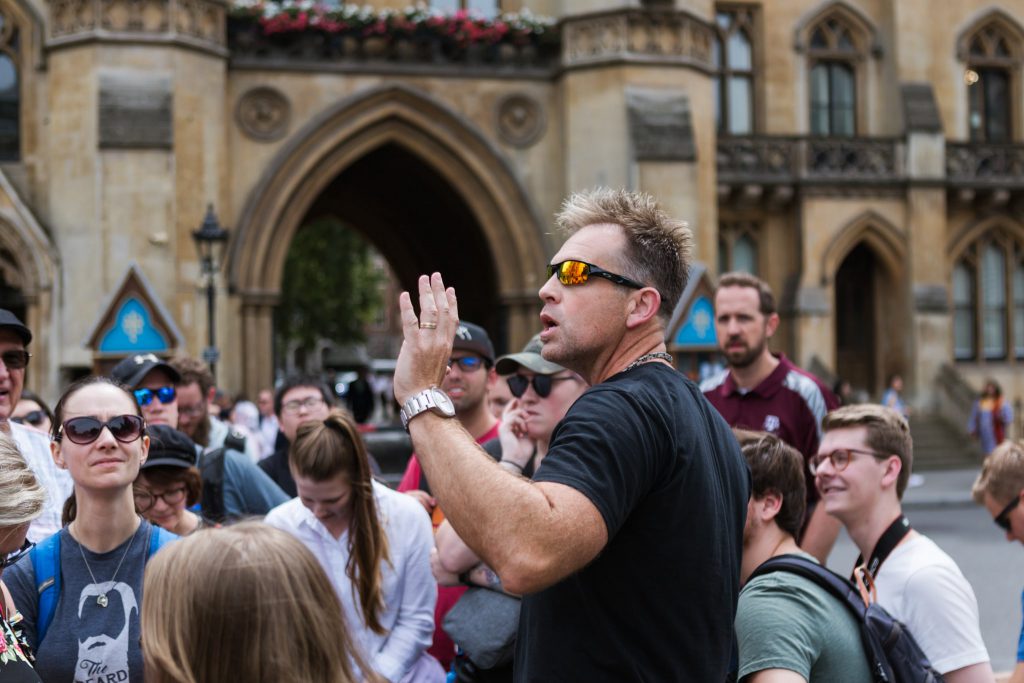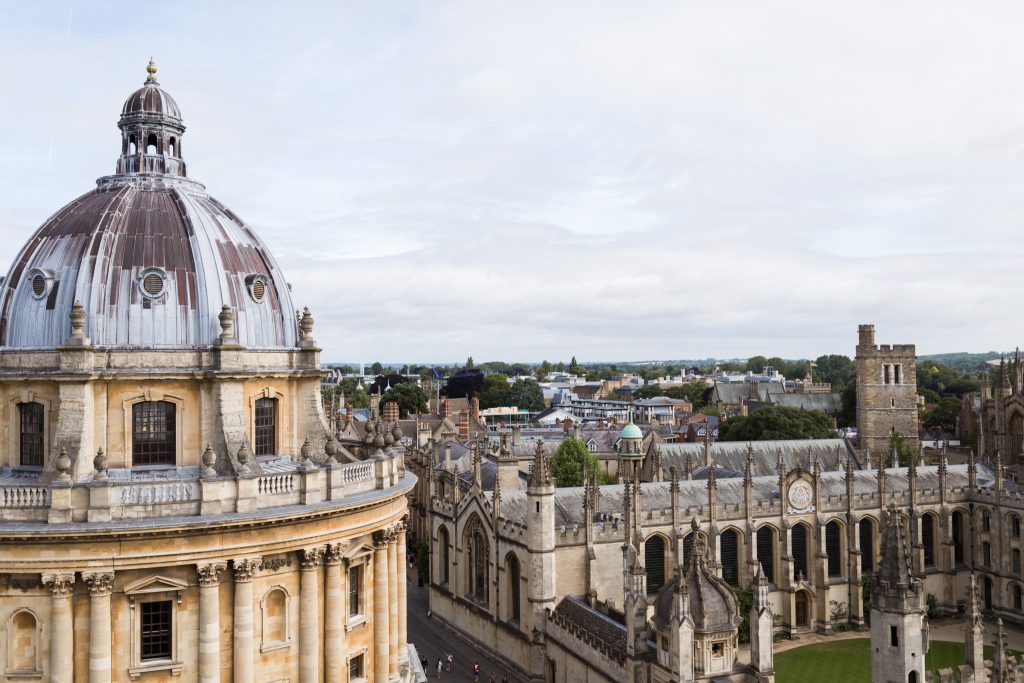Every summer, a group of students and professors from Southeastern Seminary and some of our sister seminaries voyage across the Atlantic for an educational experience unlike any other. I went on the Oxford Study Tour last summer and experienced two unforgettable weeks of traveling, learning, reflecting, exploring and seeing the Lord at work in the United Kingdom. Here are 10 reasons you should go this year:
1. Be spiritually engaged.
The Oxford Study Tour provides ample opportunities for personal spiritual reflection. On several occasions throughout the trip, we saw sites where courageous believers gave up their lives for their dissenting beliefs, many of which were not so different from ours. Dr. Stephen Eccher, Assistant Professor of Church History and Reformation Studies, was one of the trip leaders. He said,
- “The Oxford Study Tour is a unique, once in a lifetime, chance to study things like theology, missions, history and apologetics on the field in picturesque locations where past events directly shaped the way that we think about those disciplines today. For instance, we not only get to understand what the English Reformers believed in the 16th Century, but we also get to ponder the depths of our own beliefs in the very spots where figures like Thomas Cranmer, Nicholas Ridley, and Hugh Latimer all died horrific deaths for their faiths. You see, it’s one thing to know the gospel intellectually and personally. It’s quite another to stand at the spot in St. Andrews, Scotland where a then 24-year-old Patrick Hamilton died for believing one is justified by faith through grace alone.”
The Oxford tour combines the best of classroom teaching, small group time with professors, on-site lectures, reading and writing assignments and self-directed learning opportunities.
2. See the birthplace of the modern missions movement.
As Southern Baptists, we are a people committed to the Great Commission. Much of our own heritage, such as the formation of the Foreign Mission Board (now IMB), can be traced back to the modern missions movement born in England by William Carey, Andrew Fuller and others who obeyed God’s calling on their lives. On the Oxford tour, students get to see the cobble shop where Carey made shoes just outside of his church, Andrew Fuller’s church where he “held the rope” for Carey and the site where their group formed the Baptist Missionary Society, starting a movement that lasts through today.
As Dr. Eccher explains,
- “The tour also allows us to stand in William Carey’s cobbler shop at Moulton, England and to hear the story of how he caught a vision for taking the gospel to the nations. That affords us the chance to ask real questions about our own willingness to go; to the cost that Carey counted in his own life and they consider that same question ourselves.”
3. Enjoy a unique learning experience.
The Oxford tour combines the best of classroom teaching, small group time with professors, on-site lectures, reading and writing assignments and self-directed learning opportunities. Students get to learn about the history of Anglicanism and the English Reformation in the classroom and through reading, and they then experience it firsthand in historic cathedrals and services as well as martyrdom sites. All these different learning inputs combine to make an unforgettable learning experience.
4. Walk where giants of the faith lived.
You can see where Charles Spurgeon was converted as a youth and then where he pastored for the remainder of his life. You can see where John Newton pastored and wrote famous hymns such as “Amazing Grace.” You can explore the neighborhoods where literary giants such as Tolkien and Lewis lived, imagining yourself in their shoes.
5. Experience ministry in a post-Christian context.
At various points on the Oxford tour, the group visits with local church planters, pastors, and missionaries to learn about their important and often difficult work. Students learn about ministry in the unique post-Christian context of the United Kingdom, how they can pray for ministry there and how they can get personally involved.
Again, Dr. Eccher explains,
- “I love walking alongside students for several weeks as we see, feel, steep in, and interact with a culture that is ticking down to roughly 1% evangelical. That means our students get time to soak in a context that is at best post-Christian, perhaps even pre-Christian in nature. Here, the dissonance they experience between a visual skyline dominated by Medieval church spires and surrounding streets filled with what the IMB would classify as an unreached people group is striking. Such an experience certainly helps to instill in our students a vision for ‘going’ that is in keeping with Jesus’ final marching orders from Matt. 28. Our interactions with various gospel partners on the field in the United Kingdom also affords our students the amazing chance to see the various ministry models and practices they are utilizing in their own unique contexts. Here, students learn what it looks like to plant a church in London, reach a student population at Oxford, or work with the poorest of poor in the areas of urban deprivation in Edinburgh.
 From the Oxford Study Tour
From the Oxford Study Tour
6. Enjoy kinship with fellow seminary students.
The Oxford tour is a wonderful example of Southern Baptist cooperation. Multiple seminaries combine their resources, professors and students into one family during the trip, creating bonds which last long after the group returns to the United States.
Dr. Eccher’s favorite part of the tour each year is “watching as students from various cultures, backgrounds, and countries (even two different SBC seminaries) become one family in just a couple of days.” And the relationships don’t go away after the trip ends. “In short they remain a family well after we depart from the British Isles and return home,” says Eccher.
7. Learn about areas of interest outside of class.
Art lovers can find endless joy in London’s many museums and Oxford’s Ashmolean Museum. History buffs can explore Churchill’s childhood home at Blenheim Palace and get lost in the British Museum. Literature lovers can walk in the footsteps of Tolkien, Lewis, Sayers and more. Theology and church history devotees can find endless opportunities to grow their knowledge as well.
8. Seize endless free time possibilities.
Do you like bookstores upon bookstores? Historic tea rooms? Walks in gorgeous meadows? Graveyard tours? Hikes up a dormant volcano? New cultural foods? You won’t have to spend much time finding something interesting to do with your free time on the Oxford tour.
9. Navigate experiences you can’t get anywhere else.
Experience some things on the Oxford tour you can’t get anywhere else: Buy Spurgeon’s books at Metropolitan Tabernacle. Get a first edition Lewis (if you’re lucky) and read it as you walk in his garden. Read The Lord of the Rings as you stroll Tolkien’s favorite path. Worship at Evensong at the Church of England’s only dual college chapel and cathedral, Christchurch.
10. Have knowledge and memories to last a lifetime.
If this list didn’t convince you that the Oxford Study Tour is something you shouldn’t miss, think about the lifetime of memories and richness of knowledge that you’ll gain from a trip like this. Don’t let your time in seminary pass without taking advantage of this unique opportunity.
Learn more about the Oxford Study Tour.






No comments have been added.